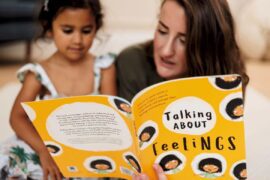By Genevieve Simperingham
For most families who practice Attachment Parenting, parents aim to overall meet their baby’s needs on demand. Parents can feel confident in the knowing that warm consistent responsiveness to needs fosters emotional safety and security. For many parents however, things start to become a bit more tricky as their baby turns to toddler and beyond, it becomes clear that the child’s wants can be very different from their needs. Little ones who are out of balance because they’ve had a busy overstimulating day become grumpy and start demanding more excitement; “take me to the park!”. Parents need to say no and their child doesn’t like it! How to be assertive without being aggressive?
For many parents, using bribes, threats and punishments doesn’t sit well with them, they know there must be a better alternative, often parents find them to be ineffective or that they deteriorate the mutual respect and listening between parent and child. Be assured, discipline without punishment is not only possible, it involves learning healthy communication skills that foster mutual respect, co-operation, respectful conflict resolution and problem solving skills – equipping your child with valuable skills for life!
Here’s an example:
Ann came to me for a parenting consultation because she felt at her wits end with her two older children (ages 4 and 6) constantly squabbling.
Ann explained that her children were being defiant, not listening, not responding to her requests and they kept bickering! She had tried bribes, threats, time out, she felt she’d tried everything.
Like all families, Ann’s have their struggles and worries. Since the birth of their third child, there’s been a lot of tension between Ann and her husband; regularly disagreeing with each other over little misunderstandings related to day to day activities.
I invited Ann to take a minute to remember being a little girl and remember how she felt with the adults in her life. I then invited; “now play with your imagination and see if you can imagine how it might feel for your little girl (the older one who Ann finds the hardest) when things are tense with your husband? ”
Ann: “I can imagine she feels really frustrated, confused and really sad, she probably feels like shouting at us to stop, to just be nice to each other”. Ann noted that it was similar to how she feels when she just wants the kids to stop fighting. Ann could feel how her children’s stress is affecting their play, how they’re both taking their irritable, frustrated feelings out on each other.
See page 2 for the rest of the story and some strategies to try…











